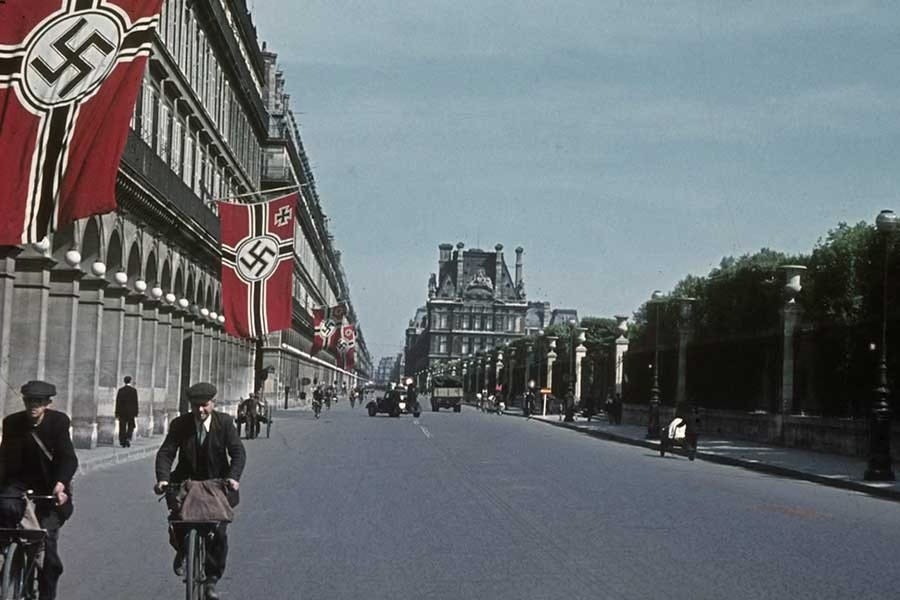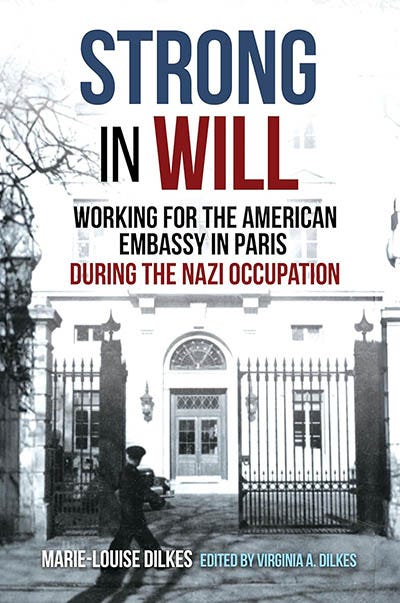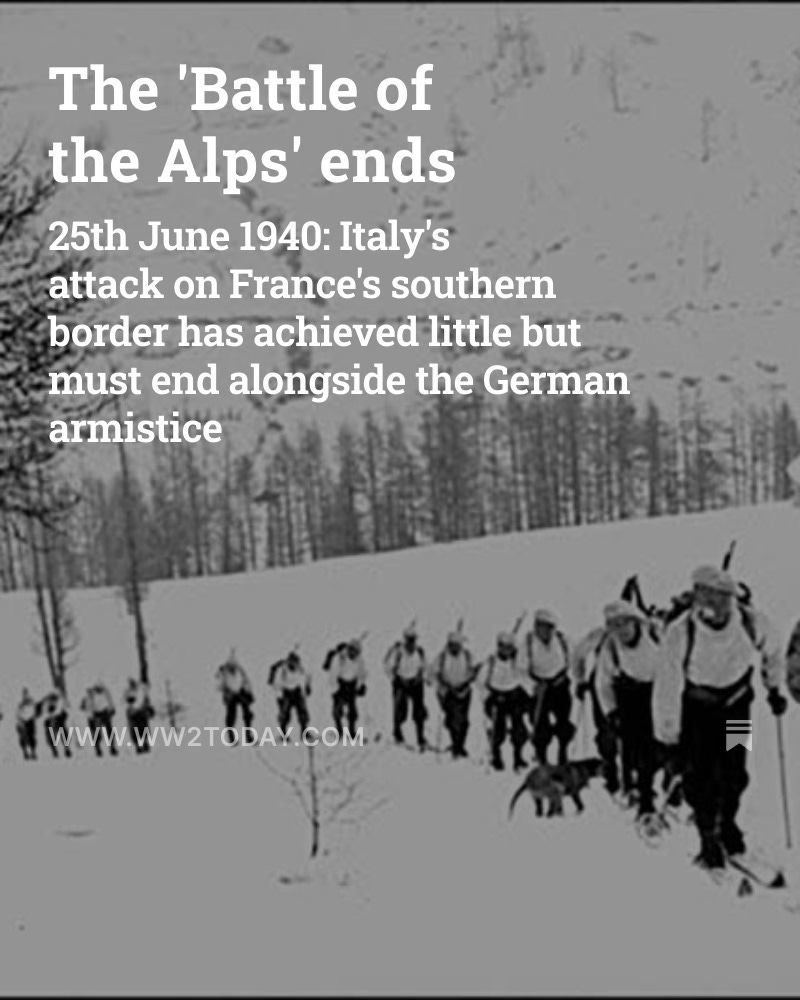An American in Paris
28th June 1940: An excerpt from 'Strong in Will: Working for the American Embassy in Paris During the Nazi Occupation', a fascinating and only recently published diary from the war
Americans in occupied Europe in 1940 found themselves in a unique position. As citizens of a neutral country, they were not directly involved in the war. But they were in a position to observe what the Nazis were doing and how they were behaving, often in a better position to see what was going on than many natives. Some US journalists were able to take advantage of the situation and produced insightful reports that were avidly read, not just at home in America, but around the world.
Marie-Louise Dilkes was not writing for publication. She was simply keeping her personal diary. But as an employee of the US Embassy, she was closer to the heart of affairs than many people. She was also very experienced, having first arrived in Paris in 1917 as volunteer who helped establish the American Soldiers’ and Sailors’ Club, a retreat for US servicemen. She developed a love of France and returned to serve in the US Embassy in Paris from 1933-1954. She was deeply affected by the events of 1940.
Hovering around me always is a feeling of apprehension. It is above me and beneath me. I cannot explain it.
Marie-Louise Dilkes did not write a full manuscript - covering just the war years - until 1955 and it was not published until 2024 as Strong in Will: Working for the American Embassy in Paris During the Nazi Occupation, following editing by her niece Virginia A. Dilkes. It’s a valuable and insightful new perspective on the period. The following excerpt covers the days just after the Germans had arrived in Paris:
June 24, 1940 …
…
There is trouble in Biarritz where thousands of people are gathered waiting for permits to cross the border into Spain. They have little to eat. Many possessing great wealth are offering large sums to those who might be useful in helping them leave France. Luxurious automobiles are being given away or sold for 1,000, 2,000, or 4,000 francs° and little more in payment for the priceless documents that will permit them to cross the barrier to safety.
The Jews are amongst the greatest number. (Many who did not succeed in escaping from Paris have been placed in concentration camps under conditions of untold privation; many have been sent to Poland.) Hitler’s fierce hatred of this race has forced them to flee.
The Embassy Goes to Market for Food
June 27, 1940
Sleep has been fitful for many for the last two nights. I have been awakened by cries of distress that seemed to be coming from the Invalides. I gave the matter little attention at first because so many strange sights and sounds come to us in our confused state of nerves. Does the war impress me too feverishly? Am I becoming a victim of these tragic events like so many others? I waited to see, before enquiring, if my imagination was playing tricks on me.
I waited for two nights. Again, last night came that rumbling sound of voices in pain. Today I spoke to a Frenchman in authority. The sounds were all too true, he informed me. The Nazis have placed their French war prisoners in the caves of the Invalides where they were being tortured.
The French and International Red Cross are working on the matter. Eventually I heard no further cries of distress coming from the building.
The Embassy goes to market every day; the Diplomatic Corps receives food cards from the German authorities. Early each morning the section of the Embassy staff in charge of providing us with food for our needs drives to Les Halles, the central markets of Paris. They fill their trucks with the necessary amount of food to keep our physical strength and our morale for the great amount of daily work there is to do.
Our “market” is arranged in the basement of the Embassy building. We stand in line, as is the fashion now, and buy our food. It is amusing and a new phase of life in France at war. It is 9:30 p.m. Time to go to bed. It is really 7:30 p.m. I have not been to bed at 7:30 p.m. since I was a child.
Madame de Ropp dined with me tonight. She lives in the Champerret district of Paris. She told me that in the large apartment house she occupies she is the only locataire in the whole building. Even the concierge has flown. The big door at the entrance remains open day and night. My friend lives on the seventh floor with no elevator functioning. She has no fear, but I suggested that she speak to the police and have someone remain in the building or at least have a guard to watch it.
The regulations concerning apartments are very strict: anyone found entering a vacant apartment to steal is punished with imprisonment. A lady returning from Angoulême, where she had gone in the exodus, found her apartment in Paris wide open; every piece of furniture had been taken….
My young concierge did not leave Paris to follow the refugees. This was due to the excellent counsel of my governess who, when she saw the girl climbing onto her bicycle the day the Germans entered Paris, asked her where she was going. The concierge replied that she was leaving, that she was too frightened to remain. Mademoiselle, my governess, told her not to leave as she would not be safer on the road with thousands of persons who were prevented from proceeding on their way from lack of gasoline, illness, starvation, and homelessness. The Nazis were bombing automobiles, women, and children. The girl was convinced and remained in Paris.
June 28, 1940
My pretty bag bought in Monte Carlo in 1935 to carry my bathing outfit is now being used to carry potatoes, butter, milk, eggs, and vegetables. In that time years ago, many years it seems, the search for amusement and good times was the high note in life. Times have changed indeed since I whiled away luxurious, leisurely vacations on the Riviera. Shall those times ever come back? Is another civilization about to be born? One wonders what form it will take….
Statues of famous French generals that have been placed in different parks and places throughout and around Paris are being taken from their pedestals by the Nazis. Some are removed, and some are blasted where they stand in military glory honored by the French. Are the Nazis afraid of that spirit of courage in the French, of that heritage of her great patriots and generals of the past? The statue of General Mangin of the Great War placed in the Place Vauban facing Napoléon’s tomb is no more there. It has disappeared.
Along my path when I leave my house in the morning, I see pasted on the wall of the Boulevard des Invalides the poster of a German soldier. He is smiling and holding a child in his arms. Around him are gathered children with their mothers, looking up at the soldier with confidence. Underneath is written Population abandonée, avez confiance dans le soldat Allemand. (“Abandoned population, have confidence in the German soldier.”) Splendid propaganda!
But shall it really lessen the hatred in the hearts of the French for the enemy? Shall they ever forget those little ones taken by force from their mothers by Nazi orders to German soldiers? Can the French forget the exodus and the sight of women and children machine-gunned to make way for the triumphant Nazis? Or those bombs falling from Nazi planes on people fleeing the oppression in other countries as well as their own?
Yet even the picture of a German soldier protecting a French child is a light of love in the blackness of Nazi cruelty….
Yesterday I had tea at the hospitable home of Mademoiselle Adrienne Monnier, the well-known French writer, whose attitude is kind yet at the same time discerning and just. She said to me, “The Germans are hearing much from the different peoples whose countries they have invaded. After they have finished with their naiveté in thinking they are a superior race, they will see that France, Poland, Belgium, Austria, Holland, Czechoslovakia, England, and the United States have national instincts and feelings; and that these nationals, too, have a right to live in their own way.”
Having the Nazis in Paris is like having a person in one’s home who has had an education of a lower order …
The Germans are carrying on their good work of “courtesy” and of trying to be “correct.” One tall, blond German officer, his face slashed by the time-honored effects of wars and duels, today opened the door for a French lady as she descended the step of the subway train. The Germans hope to be successful in their efforts to impress the French not only by their politeness but by kindness and helpfulness.
Unfortunately for them, as news reaches the French of the tyrannical hand the Nazis use over their newly gained countries in Middle and Western Europe, confidence in any kindness quite naturally vanishes.
Having the Nazis in Paris is like having a person in one’s home who has had an education of a lower order and who, in an effort to be like one and to act according to one’s training, exaggerates every move.
June 30, 1940 Military music is heard coming from the Invalides. It is the salute being given to a high ranking French officer who has gone on his long journey. He has finished the war. I hear the Réveille. The French are honoring a soldier of France….
The American Embassy Copes
July 4, 1940
This is our great day. Preparations were almost finished for our gala at a hotel on the rue du Faubourg Saint-Honoré where many guests are United States citizens. There are also many German guests there. The Management seemed to think that the feelings of the Nazis might be “hurt” should the United States Day of Independence be celebrated, and our party was therefore cancelled. The Management is right. Today we are the guests, not of France, but of the Nazis.
July 5, 1940
The Musée Rodin, which is in the château opposite my dwelling, is being aired and sunned. Pieces of sculpture of the great master are being cleaned for the reopening of the museum tomorrow.
Headlines in the press reveal our [U.S.] Ambassador has gone to Vichy where the French government will have its administration. The German press gave out that the Vichy Government with Maréchal Pétain as Prime Minister is the only French government now recognized by other countries. De C. is an American citizen. He has recently arrived in Paris with a fellow citizen from Saint-Jean-de-Luz.
He was stopped at a point on the border of France where the Nazis had decided to discontinue their triumphant march through France and which is the line of demarcation of the occupied zone. The occupied zone begins at the Swiss border going west to the Indre-et-Loire Department almost to Tours. It then takes its course straight down along the western border through Dordogne and Landes to the Basses-Pyrénées, touching the Spanish border. De C. was informed by the German guard that he should not be allowed to proceed to Paris.
I should like to remind you, however, that my country is not at war with Germany
He then appealed to the Kommandantur and explained that he and his friend were Americans. It was urgent for them to reach Paris as soon as possible and requested a laissez-passer. “Oh, yes,” said the officer in charge of the Kommandantur. “Your Ambassador hates us. He is paid by the French. That we know very well.”
“That may be,” replied de C. “That is not my affair. I should like to remind you, however, that my country is not at war with Germany.” He received the laissez-passer much against the will of the Nazi officer who did not even reply. Nor did he consent to shake hands with our Americans as they thanked him.
All Americans in Dinard in Brittany who own automobiles are ordered by the Germans to leave Brittany. The German authorities informed the inhabitants that a battle against England would shortly begin along the coast, and that if they remained, they would be in danger.
American women in France recently engaged in war work are proceeding to Lisbon from where they will sail for America. There is little for them to do, or that they will be allowed to do by the occupying power. The sense of failure and of further difficulties for United States citizens are increasing. The last members of the Field Service are leaving as well. Times are becoming critical for us.
In Fontainebleau, about one and a half’s day drive from Paris, two estates belonging to Americans but which are in the names of their French wives have been commandeered by the Germans. The family of one man with his guests and servants, about twenty-five persons, were obliged to leave late in the evening. They found sleeping quarters in the stables of the house the night the Germans moved into the main building of their home. They came to Paris the next day. Here fortunately the American had an apartment.
July 6, 1940
I am learning many things. I see many things that I might not have seen had life been different for me, things that in the past I have been oblivious of. Hovering around me always is a feeling of apprehension. It is above me and beneath me. I cannot explain it.
I have had a relatively placid, ordered life for years. I take the details of daily conveniences quite naturally. If a window pane is broken in my apartment, I at once have a new one put in. If my carpet wears out, there is more in the shops. If my plumbing goes wrong, the plumber is just around the corner. Suddenly life has changed; war invades my heretofore harmonious existence, and I realize how much these details were part of the routine of the days.
It was like the air I breathe, never thinking about air or about breathing it. They are always with me, and I expect them to be with me indefinitely. Today it is different, however. My arm chair needs mending, but there is no one to do the work. The basin in my bathroom leaks, but there is no plumber. I wish to move furniture to the cellar, but there is no one to call on. Those who did such work for me in the past have not returned from their flight and their fears. Mass mesmerism of fear has gripped them like a vise and sent them into the hell of the exodus.
Copyright © 2024 Virginia A. Dilkes, Strong in Will: Working for the American Embassy in Paris During the Nazi Occupation. Reproduced courtesy of Casemate Publishers.





